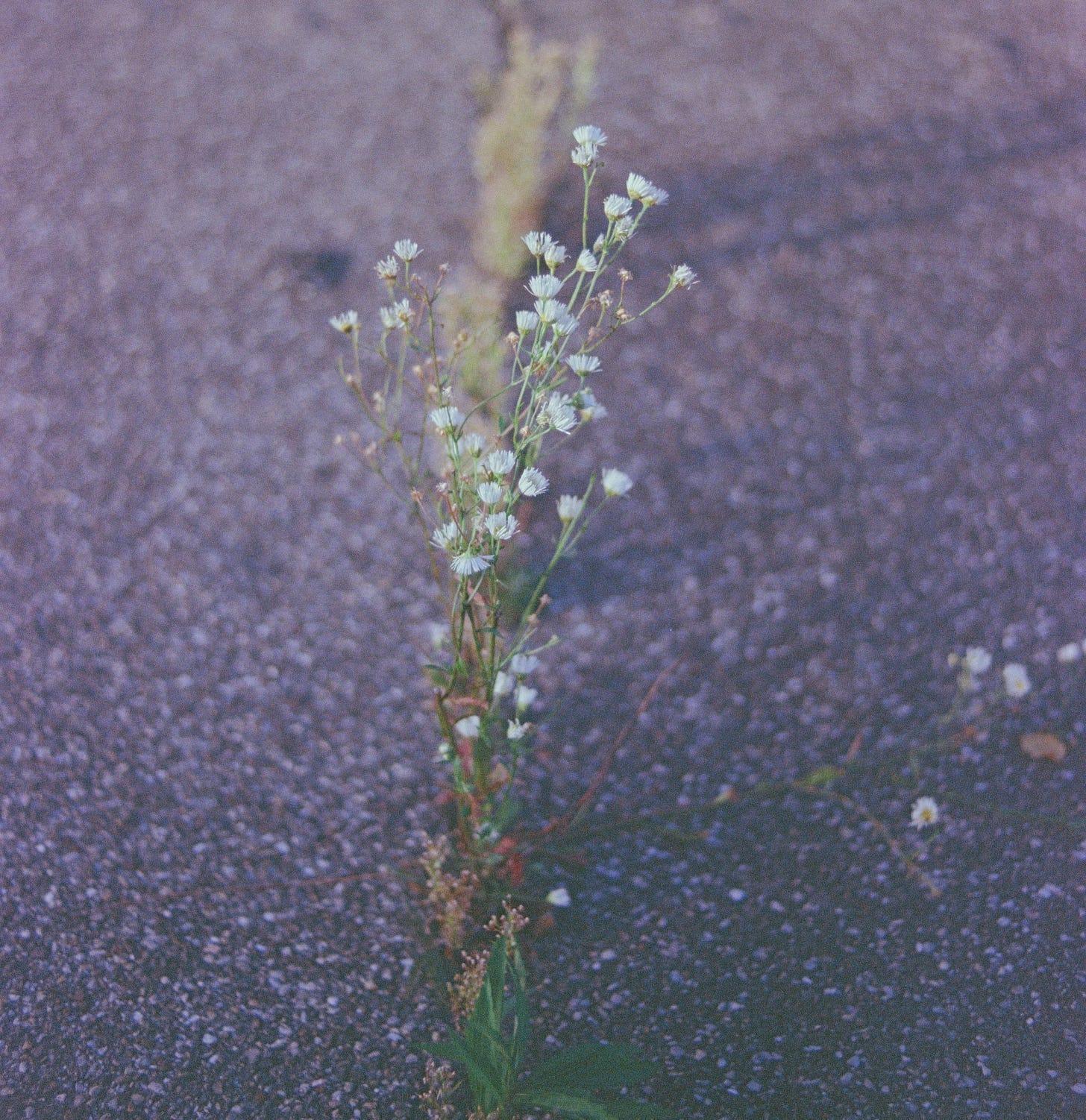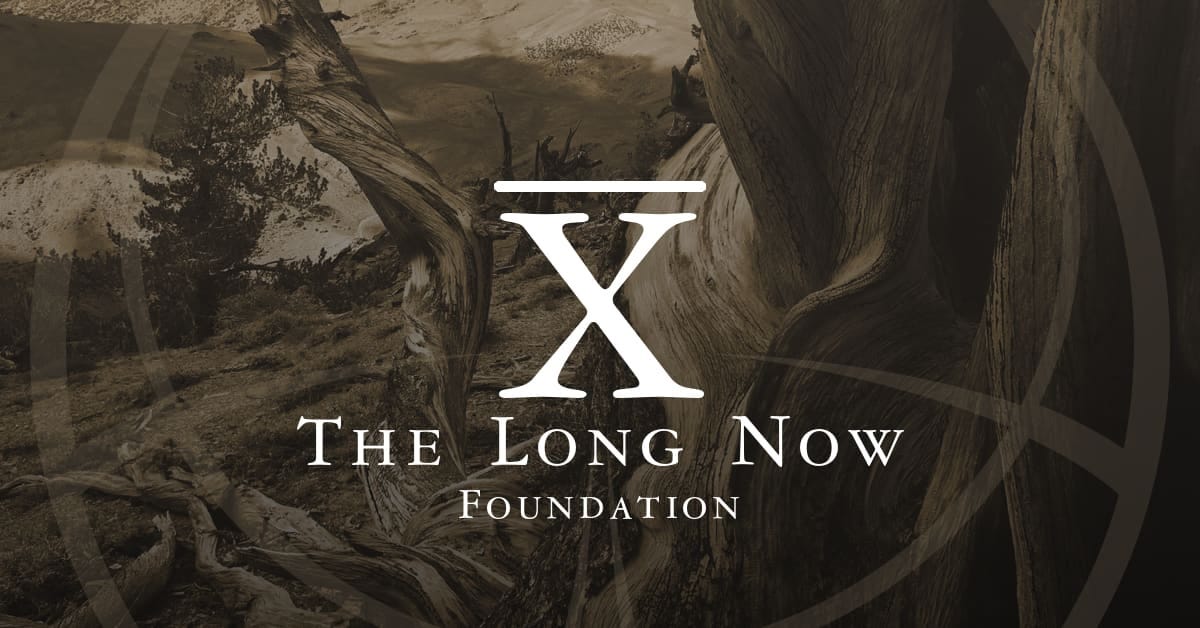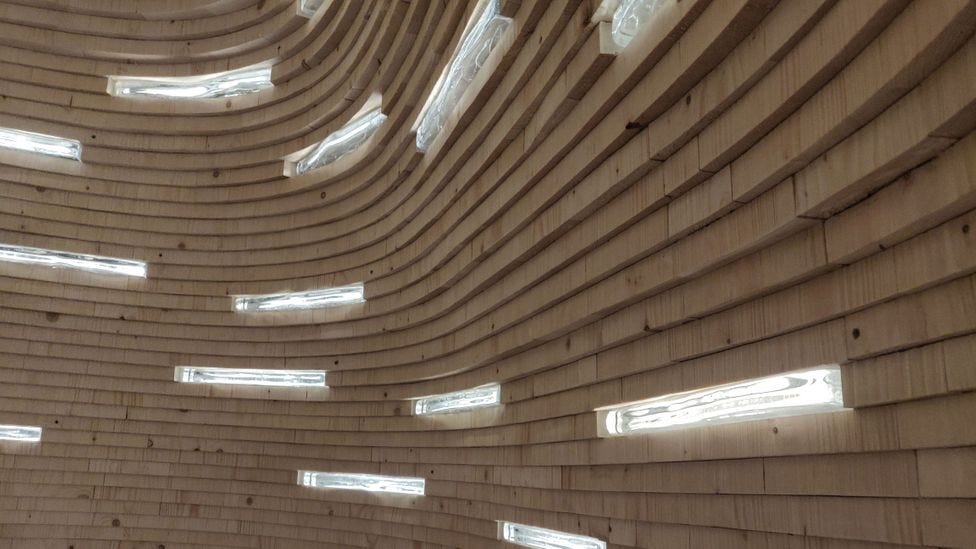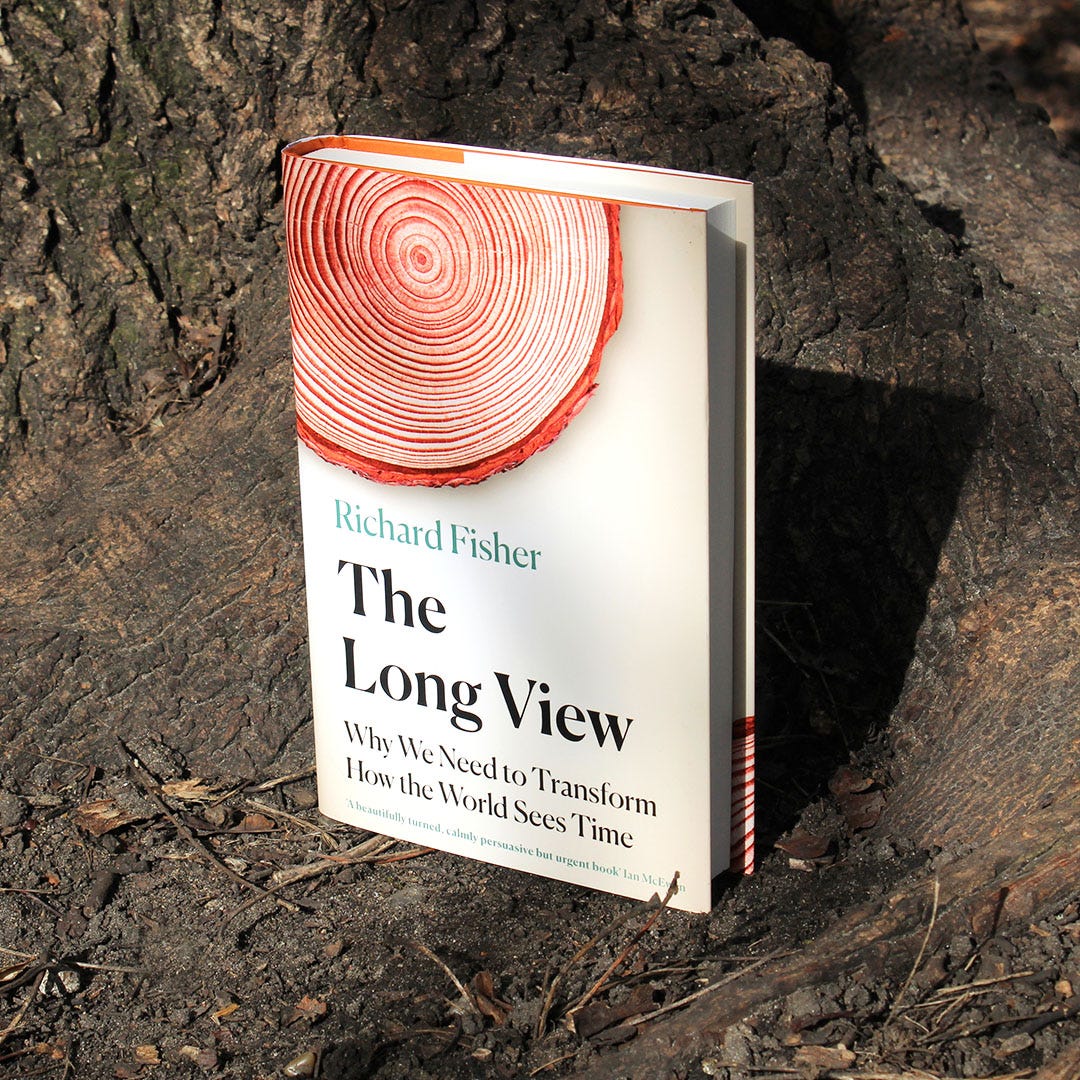'Serenteletonic': A Long View neologism
In collaboration with The Bureau of Linguistical Reality
Hello,
For today’s newsletter, we’re exploring the language of The Long View. In particular, a brand new word that we coined in collaboration with our friends at The Bureau of Linguistical Reality.
Also: six things that should be better known, a rare career opportunity at the Long Now Foundation, and how to watch the Future Library ceremony this weekend.
A new word for temporal awe
By Xander Balwit
Over the past couple of months, we’ve been building and sharing a glossary of “long-terminology”: a compendium of words and terms that relate to how we think about time. The terminology ranges from the vocabulary we use to describe our temporal biases, with concepts like “the mismatch” or “time-blinkered” to words that capture how we might expand our perspective such as “timefulness”.
In the course of collecting the long-terminology, we have discovered many rich and wonderful expressions. Still, we believe that we need a wider array of terms to capture how we think about our relationship to time, especially in cases where that relationship is abstract or complex. As Richard writes in a previous newsletter: a new word can clarify nebulous problems that lack a name, as well as identify a solution or idea that people can assemble behind.
Do you have a term you’d like to add to the list of long-terminology? Keep reading to find out how to submit your ideas
We are not alone in recognising the power of novel words. The Bureau of Linguistical Reality is a public participatory art project by Heidi Quante and Alicia Escott that also focuses on creating new language to better understand our rapidly changing world.
Recently, Heidi and Alicia agreed to meet with me, Richard and the historian Thomas Moynihan to help us coin an addition to our long-terminology.
Our assignment before meeting was to think of a word we loved or hated, and also a feeling or experience for which we wish there was a word. I brought in the term “übermorgendenken” a German expression adapted from Nietzsche which relates to his claim that a philosopher is a person who “thinks on the morning after.” Between its rhythmic internal vowels and the great playfulness of the German compound word, the choice was obvious.
For a feeling we wanted to capture, we melded Richard’s and Thomas's, which both related to the chancy-ness of how we arrived at the present configuration of the Universe and the sense of wonder we experience when we contemplate the unlikeliness of our existence.
This is the theme we would play with for our whole workshop.
Our goal was two-fold. We needed to:
1. Come up with a word (part of speech, sound, spelling, roots, and morphemes)
2. Come up with its meaning (what feeling or idea are we trying to capture?)
The process of coming up with a word took us a few hours in total and could have taken far longer, were the five of us language-lovers without other external obligations. We riffed off one another, throwing out suggestions and talking about our relationship to concepts like “the future” or “eternity”.
The experience was very free. Heidi and Alicia, who view the construction of language as “making artworks,” encouraged us to share as things came up for us. Despite the desire to come up with something truly meaningful, we were meant to play.
Play we did. Within the first hour, we had compiled a long list of sounds and roots that we liked.
Here is a non-exhaustive list:
Kairos: an ancient Greek word for 'the right, critical, or opportune moment’
Zeit: the German word for time
Kronos: the Greek word for the personification of time
Capacious: meaning roomy, with the Latin root ‘Capax’ from which we derive our word ‘capable’
Eu: the Greek root for good
Horological: which contains ‘Horae’ which were the goddesses of the seasons and the natural portions of time. This is where we get our word hour.
Serendipity: Both because we liked the meaning (accidental discovery) and because we liked the sound.
As we tossed out words and roots, discussing their definitions and etymologies, Alicia and Heidi would ask us if there were any acoustics that were coming up for us. Did we want our word to be vowel heavy? Did we want an onomatopoeia?
Between our discussion of sounds and the component parts of words (eu, bath, dipity, kronos) we talked about the ideas we wanted to capture.
How bizarre and amazing that we had a common ancestor as recently as 3,000-4,000 years ago.
What would change if we thought about ancestry as layers of sediment?
How come it is so hard to talk about positive potential futures?
How come utopias are harder to imagine than dystopias?
All the while we continued to ping-pong between the structure and sound of the word itself and the meaning. We knew that we roughly wanted to capture the sense of sublime we encounter when thinking about deep time. How, when confronting the vast tracts of time that lie ahead and behind us, we encounter fear and terror entwined with astonishment and wonder.
This is when things began to solidify into a word. We all loved the morpheme “seren” (originally from serendipity) because it sounded like “serene” and we wanted to convey a sense of tranquility when coming to terms with temporality. We had also thrown around the root “tele” which is the Greek root for “at a distance.” Finally, we brought up the word “autochthonous” which is a geological term referring to something formed in its present position. From this, we adapted the root “kthon” which is Greek for “of the Earth”, to “tonic,” appreciating its connection to geography as well as its reference to something healing. A remedy for our time crisis.
After many iterations, tweaks, and playfulness we ended up with the word:
Composed of three morphemes seren-tele-tonic, the meaning within the word is, in essence, a feeling of awe when we recognise our position within long-term time:
Calm astonishment at all the multitudinous, multi-species occurrences, chances, and couplings which led to your existence, stretching back to the very beginning of life, or even time. Sublime mindfulness that none of these sedimented happenstances necessarily needed to have happened and that, without them, neither you nor anything you recognise, would exist today. Flowing from this, keen and urgent awareness that choices made now can have an outsized impact on the spectrum of possibility concerning which futures can manifest next – of the shadow our current choices cast on all that comes hereafter– whether by maintaining choice or diminishing it, accumulating diversity or narrowing it.
You can read the full definition on the Bureau’s website, and here’s how it might be used:
Usage: Amid the rush of cars, the radio played news: war, drought, fire, floods, a homeless encampment evicted, a politician fostering anger, and the extinction of a frog that had been on Earth long prior to humanity. But as Jamie waited at the bus-stop holding their sleeping baby daughter, they saw a wildflower breaching a crack in the pavement, and in that moment felt a wave of serenteletonic.

One thing that amused us throughout our workshop was that we were all overly conscious of the constraints of time. Aware that we were meeting for what was supposed to be an hour, and dealing with two different time zones, time exerted its pressure on us throughout the session. While our aspirations were serenteletonic, our behaviour was not.
Ultimately, whether or not the word is actually adopted is less important than what it reflects: the need for more ways of interpreting and describing this period of complex global crises and our attitude toward the future.
** Thank you very much to Heidi Quante and Alicia Escott for their time, wisdom and guidance. If you’d like to learn more about the project, as well as their work as artists and communicators, check out The Bureau of Linguistical Reality website.**
—
Do you have your own idea for a neologism related to time perception and the long view? Are there pre-existing words, or roots that you would like to share with us? How about words outside English?
If you have suggestions, ideas, or additions for our glossary of long-terminology, please email thelongviewbook@gmail.com.
Six things that should be better known
This week, Richard appeared on the podcast Better Known. The premise: to select six things that people should be aware of (and one that should be lesser known)
His choices included: a man whose brain injury left him with a totally unique perspective of time, Hutton's Unconformity, the Future Library, the sublime, and the U-shaped happiness curve. He also talked about how modern media traps us in the present, the downsides of Twitter's 'main character'… and his recent mountain bike accident involving a rogue member of the tree community.
The Long Now Foundation is seeking a new leader
The Long Now Foundation, perhaps best known for its 10,000 Year Clock, has served as a focal point and supporter of long-term thinking for more than 25 years. For that reason, it faces a challenge that many newer organisations in this space (including this newsletter!) have yet to encounter: what happens when its founders and leaders get older, move on, pass the baton?
Any organisation that aspires to last for the long-term needs to think about succession. So in recent years, Long Now has been focused on planning for its “second quarter” – its next 25 years.
Now they are seeking a new leader for that transition, following current director Alexander Rose’s decision to step down. Perhaps that’s you. If you are inspired by long-term thinking and have a track record in leadership and management, here’s the job advertisement for Long Now’s new Executive Director, based in San Francisco.
Watch the Future Library ceremony this weekend
Once a year, the Future Library in Oslo accepts a new submission of a text that won’t be read until the year 2114. Richard attended the ceremony last year and wrote this article for the BBC. This year’s ceremony is on Sunday 21 May.
For those who can’t attend in-person, you can watch a livestream on Sunday morning, featuring handovers from Ocean Vuong, (FL year 2020), and German writer and book designer Judith Schalansky, (FL year 2022).
People will be walking to the Future Library forest from 10:05am (CEST), and the ceremony starts at approximately 10:45 (CEST), lasting around 1 hour.
Later, the event continues at Deichman Bjørvika, Oslo's main library. At 14.30 (CEST), artist Katie Paterson will give a short speech and Ocean Vuong and Judith Schalansky will visit the Silent Room and place the manuscripts into their drawer followed by an in-conversation event with the authors.
Details of events & livestream links:
Conversation at Deichman Bjørvika
If you are not on Facebook - watch directly on Vimeo.
Would you be willing to review The Long View?
If you’ve read or listened to The Long View, and would recommend it to others, it would be wonderful if you’d consider adding a review to Amazon or Goodreads. (Please let us know if you do, so we can thank you personally!)
The Long View is available for purchase! You can look for a copy at your local book shop or you can get it here from other retailers, as well as the e-book and Audible version (read by Richard!) If you’d like 25% off the cover price and live in the UK, visit the Headline shop, and use this code at checkout: LONGVIEW25
best wishes,
Richard & Xander - The Long View team
Previous editions of The Long View: A Field Guide









TL:DR, I tried, I really did! I just didn't have the time. But then I thought about what Merovingian said in the movie the Matrix
The Merovingian:
Who has time? Who has time? But then if we do not ever take time, how can we ever have time?
So I did it, I took the time and read it and lo and behold I'm richer for it! Can't wait to read what next.